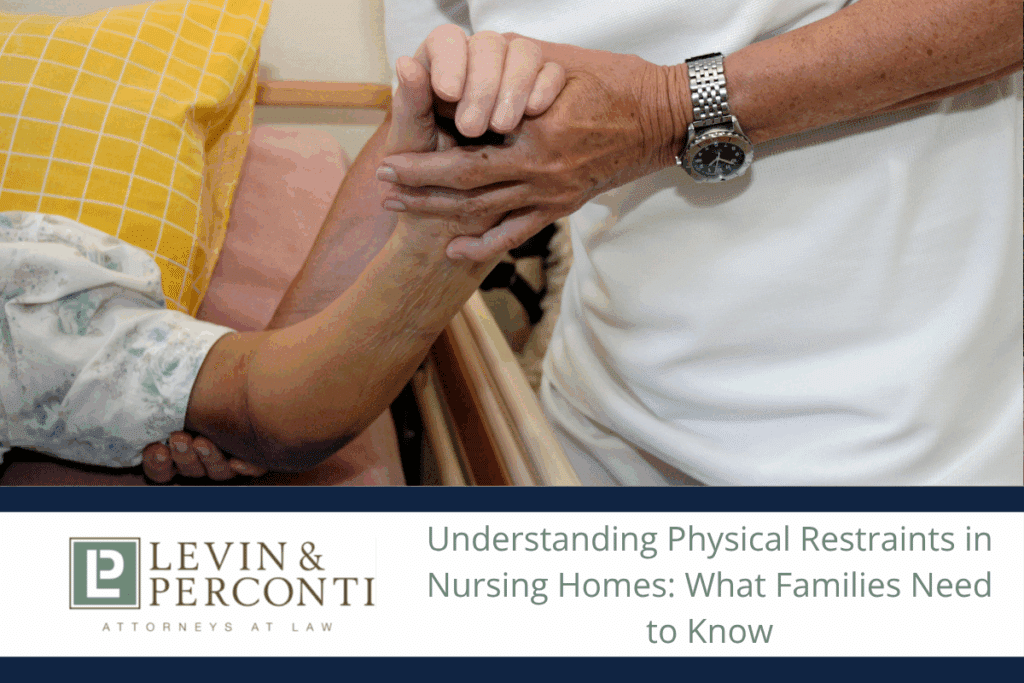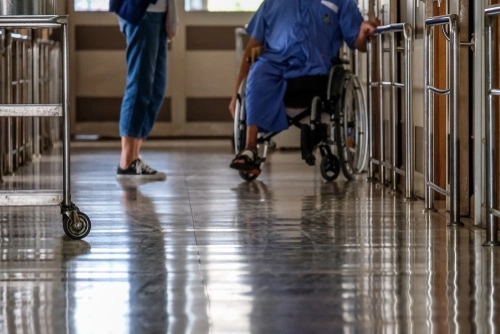Home | Chicago Medical Malpractice Lawyer | Chicago Medication Error Attorney
Quick Links
- Why Choose Levin & Perconti to Handle Your Medication Error Claim?
- How Chicago Medication Error Attorneys Can Help
- What Compensation Can You Recover From A Medication Error Lawsuit?
- Who Can Be Held Liable in Medical Malpractice Claims and Lawsuits?
- What Is the Time Limit to File a Medication Error Case?
- Frequently Asked Questions About Medication Error Lawsuits
- How Do Medication/Pharmaceutical Errors Happen?
- Who Is At Risk of Medication Errors?
- How Can Medication Errors be Reduced?
- Have You or a Loved One Been Harmed Because of a Medication Error?
Medication errors are always preventable. Patients rely on health care providers to provide a reasonable standard of care when prescribing, dispensing, or administering medication. If you or your loved one suffered harm from taking prescribed medication, our medication error lawyers in Chicago can determine whether medical malpractice is to blame. If so, we can help you pursue substantial compensation. Call us today at (312) 332-2872.
Why Choose Levin & Perconti to Handle Your Medication Error Claim?
We have been standing up to large health care providers since 1992 and are one of the most respected medical malpractice law firms in the United States. Nine of our Chicago medical malpractice attorneys received national recognition as Super Lawyers in 2024, and four more were recognized as Rising Stars. Only the top five percent of lawyers in the nation receive these honors, yet our attorneys are recognized year after year.
We have won more than $1 billion in compensation for injured clients. Our successful trial record has won us the respect of our adversaries. Medical malpractice insurers know that we refuse to settle for less than fair compensation and have sufficient financial resources to fight them and win, even if the case goes to trial. This gives us powerful leverage that we can use in settlement negotiations to maximize your compensation.
Our Notable Case Results for Medication Errors in Chicago, IL
- $5.25 million settlement for failure to treat Warfarin-induced bleeding. Warfarin was first given to him following the development of a pulmonary embolism he had when he underwent knee surgery. He expressed concern that there may be an interaction between the Tylenol he was taking and the Anticoagulant, reporting that he had blood in his urine, to which he was worked up to infection. By the time doctors acted on the problem, the patient required an emergency tracheostomy, which he needed for the remainder of his life. The tracheostomy caused the patient to contract pneumonia multiple times before passing away.
- $3.6 million settlement for the family of a 26-year-old man who passed away after being given succinylcholine, an anesthetic that should not be used in patients with high potassium levels. The medication caused his potassium to rise even further, leading to cardiac arrest and death.
- $925,000 settlement for our client who sustained ulnar nerve injury and the development of complex regional pain syndrome to the right forearm & hand. The medical professional inserted a needle too aggressively and too deep during a blood draw.
- $650,000 settlement against a pharmacy and a doctor who failed to provide the victim with new medication dosing instructions after the doctor changed the dose of his regular medication. As a result, he suffered toxicity and died as a result of this negligence.
- $200,000 settlement for a client who received improper dosage leading to death.
What Our Clients Say About Us




How Our Chicago Medication Error Attorneys Can Help
Medication errors are considered medical malpractice. When you file a medical malpractice claim, you’ll likely go up against large insurance companies, drug companies, and health care corporations. These powerful companies have massive resources to fight claims, and only the most resourceful, experienced law firms can successfully stand up to them.
John Perconti, our firm’s co-founder, is a national leader in medical malpractice claims due to his extensive experience in state and federal courts and in-depth knowledge of complex medical issues. For over 32 years, we have helped clients recover substantial compensation from large medical corporations. We know what it takes to fight negligent health care providers and have the resources, skills, and experience to win you the compensation you deserve.
You can count on us to identify the health care providers who made the mistakes and collect evidence to prove the provider failed to follow a reasonable standard of care. We have a nationwide network of the best experts in the medical field working for us, and we will use these connections to strengthen your case.
What Compensation Can You Recover From A Medication Error Lawsuit?
Compensation for medication errors may include economic and non-economic damages. Economic damages are compensation for the monetary losses you experience due to your injuries. Non-economic damages are the subjective losses the injuries cause. The table below shows examples of economic and non-economic damages.
| Economic Damages | Non-Economic Damages |
|---|---|
| Medical expenses | Physical pain |
| Projected future medical expenses | Emotional distress |
| Lost wages | Loss of bodily functions |
| Lost future earning capacity | Loss of enjoyment of life |
| Lost business opportunities | Loss of society |
| Domestic services | Inconvenience |
If your loved one passed away because of a medication error, you may be able to recover compensation for your loved one’s pain and suffering and your family’s losses, such as lost inheritance, loss of your loved one’s income, funeral expenses, and loss of companionship.
Our dedicated Chicago medication error attorneys won’t settle for less than you deserve. Call us today at (312) 332-2872 to find out how much we can recover for you.
Who Can Be Held Liable in Medical Malpractice Claims and Lawsuits?
Liability in a medication error claim is not always straightforward. Even if a provider dispenses the medication correctly, that provider may not be the only responsible party. A dispensing error could occur due to malfunctioning equipment or unclear instructions by a doctor. If a misdiagnosis causes a doctor to prescribe the wrong medication, a radiologist or pathologist may be partly to blame.
When you choose our Chicago medication error lawyers, we will hold every party accountable who contributed to your injuries or employed someone who contributed. Such parties may include the following:
- General practice doctors
- Specialists
- Surgeons
- Anesthesiologists
- Pathologists
- Radiologists
- Nurses
- Hospitals
- Nursing homes
- Surgery centers
- Birthing centers
- Pharmacies
Medical malpractice insurance companies often try to blame the victim. Under Illinois’ comparative negligence law, your compensation will be reduced if your conduct contributed to your injuries. If the insurer can pin more than half of the blame on you, the law bars you from recovering any compensation.
For example, the insurer may claim you failed to disclose information or follow instructions. You can count on us to defend you against such tactics so nothing keeps you from recovering the compensation you deserve.
What Is the Time Limit to File a Medication Error Case?
The Illinois medical malpractice statute of limitations is two years from the date of the error or the date you discover the error. Regardless of when you discover the injury, you must file your claim no later than four years after the health care provider committed the error.
Within 90 days of filing your claim, you must file an affidavit of merit, a sworn statement by a licensed health care provider that your claim is reasonable. We have experts in our network that can meet this requirement for you.
Don’t wait to contact an attorney about your medical malpractice claim. The statute of limitations is not always straightforward, and if you miss the deadline, you will lose your right to pursue damages forever. Contact us now for a free consultation.
Frequently Asked Questions About Medication Error Lawsuits
What Is The Process of Filing A Medication Error Lawsuit?
The first step in filing a lawsuit for a medication error is to contact an experienced Chicago medication error attorney. After investigating your case and identifying all the liable parties, we will evaluate your damages and file an insurance claim. If the insurance company refuses to compensate you fairly, we will file a civil lawsuit. We will work to negotiate a settlement to avoid a trial. However, if we cannot reach a fair and just settlement, we will fight for you in court.
How Much Will a Medication Malpractice Lawsuit Cost Me?
We believe that the cost of a medical malpractice lawsuit should not be a barrier to justice. Therefore, our medical malpractice attorneys work on a contingency fee basis, meaning we charge no upfront fees. We will advance your case costs, such as filing fees and the expense of hiring experts. If we win and successfully recover compensation for you, we will collect our fees from your settlement. If we don’t win, you owe us nothing.
How Much Money Can I Recover For My Medication Negligence-Related Injuries?
The compensation you can recover will vary based on the severity of the harm you suffered and its financial impact. Our resourceful Chicago medication error lawyers are committed to maximizing your compensation. We have won verdicts ranging from the thousands to the millions for medication error clients.
How Do Medication/Pharmaceutical Errors Happen?
Medication errors happen when health care professionals fail to follow best practices while prescribing, dispensing, or administering medications. Medications are powerful substances that work by altering bodily functions. Multiple providers play a role in determining a patient’s medication regimen.
Every provider has a legal duty to provide a reasonable standard of care. It only takes one careless mistake by any of the following providers to cause serious harm through medication errors:
- Doctors – responsible for prescribing the correct medications and dosage
- Nurses – responsible for dispensing and administering medications as prescribed
- Pathologists – must read lab tests accurately to ensure an accurate diagnosis
- Pharmacists – responsible for dispensing medication as prescribed
- Anesthesiologists – must administer the correct anesthesia and make accurate adjustments as needed throughout medical procedures
Common Types of Medication Errors
The National Coordinating Council for Medication Error Reporting and Prevention defines a medication error as “any preventable event that may cause or lead to inappropriate medication use or patient harm while the medication is in the control of the health care professional, patient, or consumer.”
Common types of medication errors include the following:
- Wrong medication
- Incorrect dosage
- Incorrect frequency of medication
- Incorrect timing of medication
- Wrong method of administration
- Injection errors
- Unsafe drug combinations
- Inadequate pain management
- Failure to prescribe necessary medication
- Emergency room errors
- Blood transfusion errors
Causes of Medication Errors
Human error is almost always to blame for medication errors. Every health care professional in the chain of providers—from diagnosis to medication delivery—must exercise reasonable care to prevent errors.
Misdiagnosis
If you’ve been misdiagnosed, you may receive medications for a condition you do not have while not receiving medications you need. These errors can cause you to experience unnecessary side effects and risks while the real condition is allowed to progress. If you were harmed by inappropriate medications resulting from a misdiagnosis, contact our Chicago misdiagnosis lawyers for a free consultation.
Charting Errors

Health care providers rely on the information in your chart to make decisions about your care. The following charting errors can lead to a patient receiving the wrong medication, an overdose, too little medication, or the wrong form of medication:
- A doctor forgets to list a prescribed medication in the chart.
- A doctor records the incorrect dosage in the chart.
- A nurse misreads the chart.
- A nurse forgets to document when medication was given.
Every health care provider has a duty to record the details of all interactions in your patient chart, including the medications you’ve received with the correct date, time, and dosage.
Failure to Obtain a Complete Medical History
You could receive a dangerous medication if your physician makes treatment decisions without considering your entire medical picture, including the following:
- Your allergies
- Your history of adverse medication reactions
- Your current list of medications
- Your health conditions
Failure to Monitor Side Effects
Some medications have a risk of producing serious side effects. Even if side effects are rare, doctors should monitor your response and treat any adverse reactions by adjusting your dosage or changing your medication.
Understaffing
Nurses in understaffed medical facilities work excessive hours and may become fatigued. They experience pressure to rush through care. They may spend too little time with patients to notice adverse medication effects or changes in a patient’s condition.
Understaffing in nursing homes leads to abuse and neglect of residents and increases the risk of medication errors. Nursing home doctors frequently prescribe inappropriate medication, such as antipsychotics, as a substitute for care in understaffed facilities. These drugs work as chemical restraints.
Inexperience
Understaffing in hospitals and nursing homes often leads to a high turnover among nursing staff, increasing the ratio of inexperienced staff. Inexperienced nursing staff may find medication labels and procedures confusing, increasing the risk of errors. They may also struggle with the workload, hurry through care, or fail to recognize emergencies.
Inattentiveness
Health care providers who are distracted, hurried, overworked, or fatigued cannot give patients the attention they need. Thus, providers might overlook symptoms, dispense the wrong medication, or fail to hear a patient’s complaints.
Illegible Handwriting

Illegible prescriptions or instructions can lead pharmacists or nurses to dispense the wrong medication or an incorrect dose. Electronic medical records are reducing the need for handwritten instructions for nursing staff, but handwritten prescriptions are still common.
Confusing Medication Labels
Many different types of drugs have similar names and come in packages that can be difficult to differentiate. In a fast-paced health care environment, this can lead to nursing staff giving the wrong medications to patients. Sometimes, a provider may choose prescriptions from electronic menus arranged alphabetically. Drugs with similar names can be confused if the provider is under pressure to hurry.
Emergency Room Mismanagement
Emergency rooms are fast-paced environments in which doctors often must make treatment decisions based on limited information. Due to the unpredictable flow of incoming patients, the environment changes constantly, creating pressure on providers to make fast decisions. Regardless of the time limitations, health care providers should always prioritize safety over speed.
Equipment Failures
Medical equipment and devices can improve patient monitoring and efficiency in administering medications. However, technology creates the potential for new types of errors, such as disconnected tubing, user error, poor design, and inadequate maintenance. Equipment produced by different manufacturers may work differently, increasing the risk of user error in infusion pumps and other dispensing equipment.
Who Is At Risk of Medication Errors?
Medication errors can happen to anyone, but some patients have higher risks than others.
Diabetic Patients
A study published in the European Journal of Internal Medicine found that diabetic patients have a higher risk of serious medication errors than non-diabetic patients. Clinical pharmacists involved in the study were able to detect and correct 25.8 percent of these errors. According to research, the elevated risk stemmed from diabetic patients’ need for multiple medications.
Elderly Patients
Elderly patients often have comorbid medical conditions and need multiple medications. Such conditions heighten the provider’s responsibility to consider drug interactions and the patient’s tolerance to medications. Elderly patients are also more vulnerable to serious side effects from medications in general.
Pediatric Patients
Prescribing and administering medications to children is more complex than in adults because the prescribing physician must consider the child’s age and weight when determining the dosage. These factors increase the likelihood of error.
How Can Medication Errors be Reduced?
Preventing medication errors would require system-wide changes. Hospitals, nursing homes, doctors, and other health care providers could dramatically reduce medication errors by implementing the following procedures:
- Enter all prescriptions and instructions into an electronic system.
- Hire sufficient nursing staff in hospitals and nursing homes.
- Consider patients’ full medical history before prescribing medications.
- Document prescriptions and treatments in every patient’s chart every time.
- Discuss side effects and risks with patients.
- Verify that the patient has no allergies or contraindications when prescribing.
- Involve pharmacists in dispensing and preparing medications.
- Require nurses to double-check dosages in infusion pumps and injections.
- Store dangerous drugs away from look-alike drugs.
- Group drugs together by category instead of alphabetically.
- Standardize medication carts to eliminate confusion.
What Can You Do To Stay Safe?
Communication is the most important way to minimize the risk of medication errors. Tell your doctor about all your allergies, medications, and history of adverse reactions. Learn everything you can about your medication. You cannot ask too many questions. A study by the University of Vanderbilt School of Medicine identified a higher risk of medication errors in pediatric patients when communication between caregivers and doctors was inadequate.
Before you go to the pharmacy, make sure your prescription is legible or ask the doctor to call it into the pharmacy. Ask the pharmacist to verify that the medication is correct based on your condition. Your pharmacist should also be able to provide additional information about your prescription.
Legally Reviewed by

Bonamarte, IV
Read Bio
Since 2005, Michael Bonamarte IV has been a passionate advocate for victims of negligent conduct, corporate malfeasance, and medical malpractice. He has won numerous awards and recognitions, including Best Lawyers in America and Super Lawyers’ Rising Star. He has presented for the American Association for Justice, the AAJ Nursing Home Litigation Group, the John Marshall Law School, and numerous other legal associations. He regularly lectures at Chicago-area aging organizations about nursing home abuse. His writings have been published by the American Bar Association, the Chicago Daily Bulletin, and numerous other prestigious publications.
Related Pages
Notable Results
for failure to properly read pap smears, resulting in the misdiagnosis of cervical cancer and eventual death of a 35-year-old mother of three children.
for failing to biopsy a known breast tumor, resulting in the delay of diagnosis of breast cancer, causing death.
for failing to perform an annual pelvic exam, which resulted in the untimely diagnosis of ovarian cancer.
Have You or a Loved One Been Harmed Because of a Medication Error?
When a medication error occurs, the effects can be devastating to victims and their families. These errors can result in serious medical complications and may even cause death. Victims should understand their rights to ensure they receive fair and reasonable compensation for their injuries or loss.
The Chicago injury lawyers at Levin & Perconti have represented numerous clients who suffered serious personal injuries due to medication errors and have recovered notable compensation on their behalf, including a $650,000 settlement against a Chicago-area doctor, medical group, and pharmacy.
If you believe you or a loved one may have a medication error case in Illinois, please call us for a FREE consultation at (877) 374-1417 or (312) 332–2872 or contact us online.

Related Blogs















